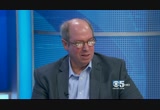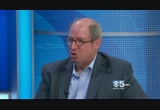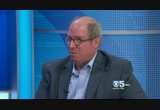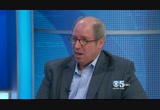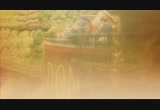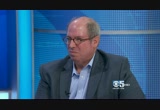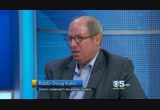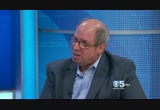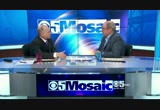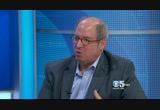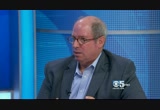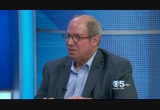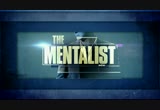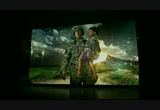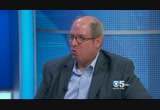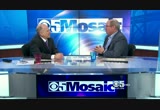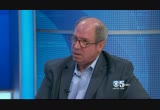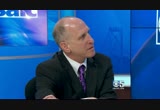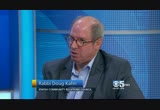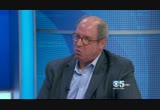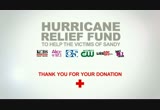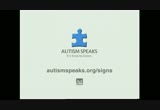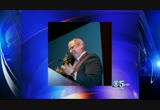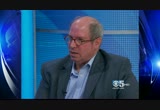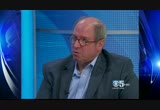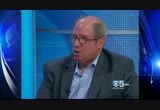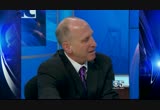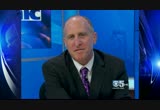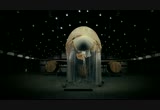tv Mosaic CBS November 25, 2012 5:00am-5:30am PST
5:00 am
dedicated to a wonderful conversation with rabbi doug conza, the jewish relations council based in san francisco and serves the entire san francisco bay area. welcome, doug. >> thank you. it's a pleasure to be here. >> you were recently celebrated in the community for 30 years for service in the community as your role at the jewish community relations council. fascinating and wonderful career you've had there. what, what was -- what is the mission of the jewish community relations council, the jcrc? >> well, i can't believe 30 years have flown by as they have, but i came in 1982 and i came to an organization that was founded just after the end of the holocaust when the american jewish -- community -- the response of the american
5:01 am
community and the american jewish community was clearly much weaker than it should have been. and one of the conclusions that was arrived at was that while there were organizations and individuals who spoke out, there was not a united voice for the community and that fatal flaw must never happen again. and so our jewish community relations council, jcrc and others around the country were established to bring together the full diversity of the organized jewish community to develop consensus and to speak with the united voice on those issues of vital concern to our community and it's something we've been doing ever since. >> it's such a fascinating organizations. what are some of the highlights you would say over your 30 years that you would point to as successes in communal relationship building and success in perhaps preventing what otherwise might be difficult circumstances? >> well, i think one of the things that has helped 30 years fly by is the range of issues that any of us get to deal with
5:02 am
on a daily basis, or throughout our careers. so i think about the fact that when i first came in, it was the height of the movement to presoviet jews. one great highlight was being actively engaged in that movement to its successful conclusion. i might add when people thought there was no chance the soviet union would open its doors. and now it's a stunning celebration, really, of the fact that more than a million jews were freed from the soviet union, many who came to our community and today are actively involved including in our own organization. that was a highlight, including many important points, the shaw came to san francisco and spoke at a rally with thousands of people directly in front of the soviet consulate. i think about the work we did with the survivor community, holocaust survivors, who after the holocaust wanted to be sure
5:03 am
that every effort would be expended to perpetuate the memory and lessons of the holocaust. i think about the establishment in san francisco of the holocaust center and the holocaust memorial and our annual holocaust remembrance observance, as three ways to make sure that that legacy was preserved, another highlight. then i think of our work on hot issues that are merged even as recently as last year when there was an attempt to put on the ballot that would attempt to ban circumcision of minors in san francisco and we were successful in fighting that initiative in part because of that consensual voice we bring to the community. there are many others, but those are just several. >> we're going to take a quick break and return shortly to mosaic. please join us in just one moment.
5:05 am
. welcome back to mosaic. i'm honored to be your host this morning. we're in the middle of a robust conversation with rabbi doug kahn, who has been with the jcrc for more than 30 years now. we are talking about the highlights of the jcrc, that it was established essentially in the after math of the holocaust, really in a self rereflective way to say we weren't as quite as organized as a jewish community as we needed to be to advocate for our own needs. and you took us through some of the history of the soviet jews, former soviet union, all the way through to some of the situations that come up actually more recently on the san francisco ballot, the issue around circumcision, which is
5:06 am
quite a controversial topic. i'm wondering if you can talk a little bit about the groundwork that you do, because i know and so many of us know that the jcrc engages in such a deep level of interpersonal relationship way beyond the jewish community itself and that actually is part of its success. i wonder if you can comment on some of the communal dynamics you see in the community on that level. >> it's a great question. i think the groundwork exists both within and beyond the jewish community. within the community, jcrc represents about 70 institutions, from left to right, reform, conservative, orthodox, involved with israel, involved with the broader issues, to social justice issues, the community, kind of the full spectrum. so one of the things that i think is important is that bringing together these diverse voices, we can test the various perspectives and walk out with something that really does represent the overwhelming consensus of the community, which then empowers us to act
5:07 am
effectively on the key issues. whether it's advocating for strong support for american-israel relations, it's working hard on issues of immigration reform and civil rights, it's working for quality public education, kind of the full spectrum of issues of importance to our community. so that work is very important. and at the same time, building bridges beyond the jewish community is our bread and butter work, relationship building with key leaders of other communities. historically, we have worked very closely with the african american and the asian and latino communities, with other religious communities, and sought areas of common concern. we've developed coalitions on major issues such as working on the area of human trafficking, working on the area of international human rights and what has happened in darfur, working on local issues in terms of enter group tensions and issues of race relations and all of these issues have required not just the voice of one community, but our community is
5:08 am
coming together. we are at the end of the day a fairly small community, so we build an effective coalition -- if we build an effective coalition, our potential impact is far greater. so we live in a very dynamic state and we live in a very robust part of the state when it comes to issues of social concern on many, many, many different levels. i'm wondering when you look at all of the possibilities of what to respond to, what are the thresholds of engagement for you to say, well, we need to take a stand or engage on this issue? then if you're focusing in on consensus building, then is there a line in the stand on any particular issue where, where consensus is either poorest or challenged or some stand needs to be taken that might in fact be considered in the political spectrum a minority stance, but one that we know historically needs to be taken? how do you struggle with those
5:09 am
real, human dynamics? >> those are great questions and hard to answer very briefly, but i'm going to try. on the first question, it's interesting. i would say for all of my 30 years and my mentors, earl rab and rita seminole, the directors who hired me and their 10 years prior at jcrc, the question is what is a jewish issue and what is a jcrc issue and that itself is a robust debate. generally speaking, we look first at those issues that have an impact or affect the jewish community as a community. and those include the obvious particularistic issues, such as antisemitism, church/state separation, american support for israel, our homeland and those kinds of issues. but it also relates to issues such as civil liberties, civil rights, quality public education. historically we have had a deep stake in those issues as a community, but we will always have that robust debate about
5:10 am
where does that line get drawn. and with respect to consensus, we actually have a very formal definition within our bylaws, which requires a 75% threshold and still, we may have minority perspectives. but if we can get 75% of our members having gone through a very in-depth process to agree on a particular approach and strategy, then we think that that's going to stand the test well in the community and that the descending advices will be there and to be respected and do not detract from consensus. our stance on the issue of same-sex marriage, where there were voices that said that doesn't necessarily comply with their perspective, but there was such an overwhelming consensus on that issue that we could then carry out with great credibility in the community. >> so structurally, if the organization says 75% is a threshold that constitutes consensus by which then the organization speaks as one voice and on behalf of the jewish
5:11 am
community, does one formally become a member? >> to become a member of jcrc means that you are involved with an organization that is eligible for membership by virtue of being a nonprofit organization that has a community relations agenda at the core of its organization. >> ah. >> so our membership is comprised of an all number of member organizations and what we call at-large members, so that hopefully we're bringing together representation that touches virtually all of the organized jewish community that way. >> we're going to take a quick break and rejoin this conversation in just a moment here on mosaic.
5:13 am
♪ getting closer to nature can get you closer to your family. go to discovertheforest.org. we wanted to serve our country and protect the things we love. we were ready to face any missi, and help those in need, but for some of us, coming home was more of a challenge than we expected. in the service, we had each other's backs. but as veterans, it can sometimes feel like we're all alone. [ woman ] at the veterans crisis line, we understand what you're going through, and we can help. it's your call. . welcome back to mosaic. you're looking at a beautiful invitation of honoring rabbi doug kahn for 30 years of service at the jcrc here in san
5:14 am
francisco. it was a wonderful, wonderful evening. what initially attracted you to this kind of work and in particular to the jewish community relations council itself? >> so i grew up in san francisco. i'm a fourth generation san franciscoan. i'm passionate about the city and the area, passionate about the jewish community, passionate about the issues that we address. i also grew up in the sixties. i went to uc berkeley starting in 1968, a time when there were four issues of great moment on the agenda that i was drawn to. the civil rights, the civil rights movement and the vietnam war movement, or the antivietnam war movement on the universal side of the ledger. the aftermath of the six-day war and american jews new love affair with israel in the wake of that war, and the beginning of the soviet jew movement on the more particular side of the agenda. i found myself drawn equally to all of those four extraordinary
5:15 am
issues and becoming engaged in them and became an activist. and when i ultimately looked at what i wanted to do after rabbinical school, i realized jcrc afforded the opportunity to continue to be actively engaged in both the universal side of the ledger and the particular side of the ledger. to this day, that is exactly what every day has looked like, a balance of those n a sense, i would like to say i have never grown up because i continue to work on that full range of issues that excited me in my early days as a youth. >> when i was listening to you, you listed issues of local concern, of national american concern, a jewish concern, if you think about sort of an ethnic identity issue of concern, and concern of israel. so in that way, you talked about us both being particularly universalistic, encompassing different geographies, points of access relationship for american and jewish identity development.
5:16 am
i'm wondering if in your 30 years since the sixties and the uniqueness of all of that, if you have seen patterns over the years as the different issues emerge along the way. >> i think there are always -- there are always going to be shifts in the priorities of our community. and one of the patterns that definitely has emerged over the last number of years is a greater concern about the growth of antiisrael activity in the bay area, which has taken a significant amount of our time. and so one thing that we've had to be sure about is that we could simultaneously address the challenges to israel's legitimacy and preserve the time for that outreach to other communities on local issues of vital concern, because the two have to continue to coexist together. and indeed, i think one of the things that i have always been struck by in my work with jcrc is that the people who are actively engaged are drawn both
5:17 am
by their passion for strengthening the jewish community and our relationship with israel and their passion for social justice, fulfilling the ideal that all human beings are created in the image of god. and having that twin set of values can be acted upon on a daily basis, is in many ways what i think jcrc is really about. i like to call it impactful activism. >> it occurs to me that you're talking about an organizational structure that in some ways might at first blush look at organizational structures and world events. but in fact, i think that every individual internally reflects upon issues of how do i want to be in the world as an individual and what are the things that are important to me when i look at issues in my own community, like the way the community understands issues around israel, the way the community understands issues around jewish life, understands issues around poverty, education, other kinds
5:18 am
of social justice civil rights, and how do icon vert that personal reflection into something that's part of a greater organizational structure. and i'm wondering if you can talk a little bit about how you've experienced individuals to their self rereflective selves over this greater organizational structure. >> what's fascinating is many people are passionate about one issue or another and that can often also be very personal in terms of what makes them passionate about that issue. jcrc offers the opportunity to determine which issue rises to community priority and to provide a vehicle when they rise to that particular level. the very nature of making consensus about is helping everybody who comes into the room with a particular passion understand that for the greater good, sometimes we set aside
5:19 am
those particular passions or those particular viewpoints to try to arrive at something that will enable the community to come out with the strongest possible position. and i have seen that work time and time again. and it's beautiful to watch. when we had a task force that worked on issues around affirmative action, we had task forces that worked on immigration reform issues or on the issues of immigration -- on issues of civil rights, and we would see people come in with very different kinds of viewpoints, but ultimately be willing to park their personal agendas at the door for the greater good. and it's through that consensus process that that happens and our community is much stronger as a result. >> just fascinating. we're going to continue our conversation in just a moment here on mosaic. please join us.
5:20 am
,,,, in 1977, in johannesburg, south africa, an 8-year-old boy picked up the game of golf from his father. by the age of 9, he was already outplaying him. the odds of this gentle lad winning the junior world golf championships at the age of 14? 1 in 16 million. the odds of that same boy then making it to the u.s. and european pro golf tours? 1 in 7 million.
5:21 am
the odds of the "big easy" winning the open championship once and the u.s. open championship twice? 1 in 780 million. the odds of this professional golfer having a child diagnosed with autism? 1 in 88. ernie els encourages you to learn more at autismspeaks.org/signs. early diagnosis can make a lifetime of difference.
5:22 am
. welcome back to mosaic. you're looking at a wonderful picture of rabbi doug kahn receiving his awards from his evening of being celebrated for his 30 years of service at the jewish community relations council. doug, what are you holding there? >> i am holding an oscar. it's now on my mantle, an award i was given for being an advocate, or i guess the best advocate is what they called it. it was an evening that touched me greatly. the chairs of the event and all of the organizers, the superb lay leaders who work with jcrc and our outstanding staff put on an event that was a total surprise for me and a great success for jcrc and i thank the community and one i will treasure forever. >> oscars were there because you are among many, many other things, a lover of movies. >> this is very true. i like to say i like bad movies. [ laughter ] >> do you have any movies that
5:23 am
you've seen lately that you suggest? >> i just saw with my wife the movie "flight" with denzel washington, which is a very tough movie and one of the greatest performances i've ever seen. >> great, wonderful. so 30 years. what do you look at in terms of future trends? what do you think is really on the horizon as we look toward the eternal values of communal engagement? >> so i think one of the trends that i've seen in recent years has been the growth of antiisrael activity in the bay area, which i really trace back to the second intifada, when we saw a number of organizations emerge as a result of government policies, but really challenge the right of israel to exist as a state. we've taken on that challenge tremendously. obviously, we support a strong israel-american relationship and a strong jewish and democratic state of israel, and i think that's a trend we've been concerned about in the
5:24 am
community. >> whether you use the term antiisrael, people think you didn't use antisemet particular or antijewish. is antiisrael is the stance that israel doesn't have the right to exist as its own sovereign country in the world? >> i'm talking about voices that really challenge the right of israel to exist as a state at all and that, of course, is something we have taken a strong stance against. in the same time, we've also seen a trend of growing polarization within the broader society. it was evidenced again in this most recent presidential election. and it's polarization that has seeped into our own community. we've had a number of flash points in our community in the last few years and what's been important to make clear is that jcrc has always been the holder of civil discourse, because we've always brought together those diverse voices.
5:25 am
so we've played an ever increasingly important role in helping navigate tough community issues that have arisen when there have been sharp disagreements over a particular speaker or a particular event and whether this individual should be allowed or this event should be allowed to be held within the community. and jcrc has been able to come in as a voice to help build consensus around how to go forward and also to model civil discourse. in fact, about a year ago, we completed a year of civil discourse, which touched almost every corner of our community. and i think it has greatly helped address that. and i guess maybe the last trend i'll mention among many is when i started, there was no internet, there were no personal computers. and now everyone has a voice. and that makes it sometimes more challenging, because on any given issue when we want to be able to articulate the communal consensus voice, there are also potentially dozens or hundreds of other voices that can easily be sent out by the press of a button and still, i think our
5:26 am
work is more important than ever in that atmosphere. >> when i hear you speak, it's interesting that in some ways you're juxtapositioning greater ability to communicate, which means more conversation to a greater sense of polarization. and i'm wondering, to me, when i hear people feeling polarized, ultimately i feel there's something there where one side or the other feels a sense of threat, even in the midst of even more conversation and more information. and i'm wondering what -- does that ring a bell for you? does that seem like it's part of the mix? >> i do think you're right. i do think more people feel a sense of being threatened by one thing or another out there and that this is kind of a reaction to that. and as a result of the growth of antiisrael activity that i was describing, a sort of a strong response to that from various segments of our community. and similarly, with other
5:27 am
issues. and i think jcrc comes in there with a very activist approach, but with also a very kind of measured tone to try to bring down the temperature, bring in those diverse voices, find a way to get people to reason together and come up with a way to move forward, because at the end of the day, that's going to serve our community the most. >> thank you so much, doug. believe it or not, we're at the end of our conversation. we put a comma in our conversation. we hope you have felt engaged and consider all the different ways in which you can add your voice to the greater conversation in our community. thank you so much for being with us here on mosaic. have a wonderful day.
5:29 am
138 Views
IN COLLECTIONS
KPIX (CBS) Television Archive
Television Archive  Television Archive News Search Service
Television Archive News Search Service 
Uploaded by TV Archive on

 Live Music Archive
Live Music Archive Librivox Free Audio
Librivox Free Audio Metropolitan Museum
Metropolitan Museum Cleveland Museum of Art
Cleveland Museum of Art Internet Arcade
Internet Arcade Console Living Room
Console Living Room Open Library
Open Library American Libraries
American Libraries TV News
TV News Understanding 9/11
Understanding 9/11